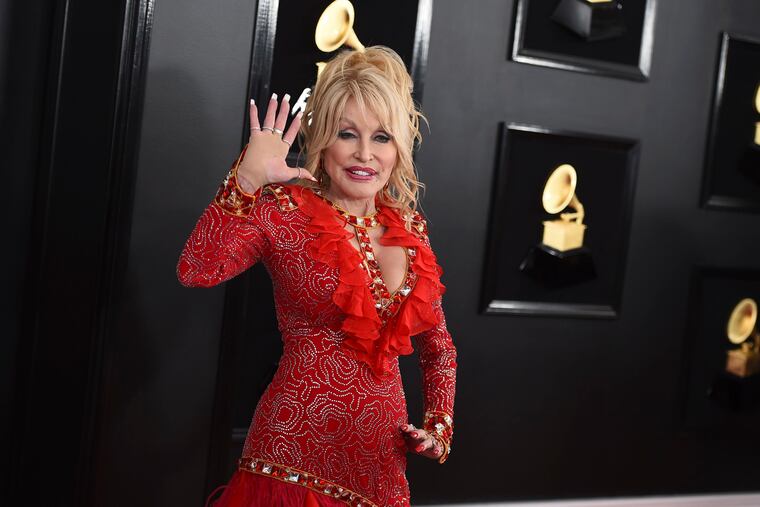Dolly Parton is giving away thousands of children’s books in Philadelphia
So far the program has given away more than 150 million books to kids from birth to age 5. It covers all of Delaware and is coming to Philly.

Robert Lee Parton Sr. had 14 children and never read to any of them. Not that he was a bad father, recalled his famous daughter Dolly.
He was just illiterate.
Dolly Parton, of course, now 75, would go on to become a prolific songwriter, megastar country singer, and actress. But she said her father took particular pride in the fact that she became a giant in the world of books, creating an Amazon-level book distribution organization.
She is no Jeff Bezos, however. At 154 million and counting, she likely holds the record in the known universe for most books given away, courtesy of her 26-year-old Dolly Parton Imagination Library, which is aimed at promoting literacy among children.
In a program that got underway last month, over 14,000 of those books have been distributed throughout Delaware. The Little Engine That Could and up to 60 other titles could be coming to 2,000 Philadelphia children.
» READ MORE: Most Philly kids off track on reading; school board grills Hite
“Daddy took a lot of pride in this,” Parton said in a Library of Congress interview in 2018, eight years after her father died. “My dad could neither read nor write, but he was one of the smarter people that anyone would ever want to know.”
Parton, famous for her signature vocal style and subtlety-is-no-object wardrobe and makeup — “It takes a lot of money to look this cheap,” she has said — has won multiple awards in her entertainment career, and is one of the country’s highest-profile philanthropists.
But she has declared that the Imagination Library, which began in her home county in Tennessee and has since spread to several states and six countries, is her “greatest achievement.”
Getting with the program
Under the program, any organization or entity can become an “affiliate,” provided they can ensure that all children, from birth to age 5, within a defined government boundary or zip code receive a book every month.
Birth might seem a little soon to participate in a reading program, but not so, said Annie Norman, head of the Delaware state library system, the Diamond State affiliate. “Some mothers read to the baby in utero. It’s never too early to start.”
» READ MORE: Two-thirds of Philly kids can’t read at grade level. Can a library in a barbershop change that?
The average newborn isn’t quite ready to dive into War and Peace, and the first book is always The Little Engine That Could. “That’s Dolly’s favorite book,” said Christy Crouse, regional director of the Dollywood Foundation. The book also comes with a personal note from Parton and, in Delaware, a “baby Blue Hen” library card.
The participants then will receive one new book a month until they “graduate” at age 5, when their gift list bookends with Look Out Kindergarten, Here I Come.
The books are reviewed and selected by a national panel.
Through a special arrangement with Penguin Random House, Parton’s organization acquires the books at cost, about $2 each. The affiliates pick up the tab, and the Tennessee headquarters packs and ships the books.
Five years’ worth of books would cost about $120 per child. That price tag was so modest, said Norman, that Gov. John Carney’s administration signed off on expanding what was a pilot program to the entire state.
Foundations Inc., a nonprofit based in New Jersey that is the Philadelphia affiliate, wouldn’t mind if something similar happened in Pennsylvania. Elizabeth Cieri, the group’s executive director of teaching and learning, said she views the Philadelphia project as a pilot program, with the aim of luring more sponsors.
It has confined the giveaway to one zip code, 19133, for a simple reason, she said: “We had limited funds to start.”
The Philadelphia Story
One of the challenges that affiliates confront is locating recipients, along with keeping track of those who move. That gets complicated. For example, an estimated 15% of people move annually from 19133, according to the U.S. Census. The Parton organization uses a software program to help track movers.
To identify recipients, the affiliates enlist the help of community groups. The Philadelphia program, in particular, is going to require some legwork, said Cieri, and the process has just begun.
Paper forms are available at the Lillian Marrero and the Maria de Los Santos Health Center, and parents can sign up by using an online form.
However, it is unclear how many of the 9,000 or so households in the area have internet access, which is east of Broad Street, from just north of the Temple University main campus to Allegheny Avenue to Front Street.
» READ MORE: Philly’s childhood literacy rate is still too low | Opinion
The area is roughly divided between Spanish and English speakers, and for now, only two of the books on the list are bilingual, said Crouse.
It is economically distressed, with a median household income of just over $20,000, or a third of the rest of the region’s, according to census data. In all, 58% of the children live in poverty, and fewer than 60% graduate from high school.
Norman, the Delaware library director, said the hope is that the reading program ultimately will boost school performance, and she anticipates that some type of tracking system eventually would measure the impacts.
“The books are fabulous,” she said.
“Of all the things I’ve done in my life, this is one of the most precious,” Parton has said. “I think about my dad. He must be up there thinking, ‘Yeah, you did it.’”